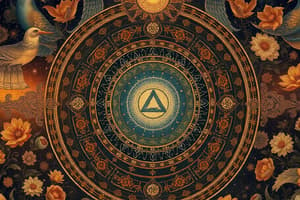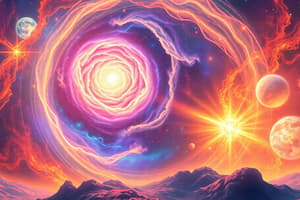Podcast
Questions and Answers
What is the age of the universe approximately?
What is the age of the universe approximately?
- 10 billion years
- 3.8 billion years
- 4.6 billion years
- 13.8 billion years (correct)
The Multiverse theory suggests that there is only one universe that contains everything.
The Multiverse theory suggests that there is only one universe that contains everything.
False (B)
What element is believed to be the first created after the Big Bang?
What element is believed to be the first created after the Big Bang?
Helium
The theory that suggests the universe alternates between expansion and contraction is called the ___________ Universe Theory.
The theory that suggests the universe alternates between expansion and contraction is called the ___________ Universe Theory.
Match the following theories with their descriptions:
Match the following theories with their descriptions:
Which era is characterized by the dominance of radiation?
Which era is characterized by the dominance of radiation?
Capture Theory suggests that the Sun ejected material into space due to its interaction with a smaller protostar.
Capture Theory suggests that the Sun ejected material into space due to its interaction with a smaller protostar.
Our solar system is ________ billion years old.
Our solar system is ________ billion years old.
Flashcards are hidden until you start studying
Study Notes
Universe Overview
- The universe contains all physical existence, including time, space, matter, and energy.
- Estimated to be approximately 13.8 billion years old, determined by the oldest star ages and expansion rates.
Theories of the Origin of the Universe
- Divine Creation Theory: Suggests a supernatural being created the universe and life from nothing.
- Big Bang Theory: Proposed by Georges Lemaitre; posits the universe began as a hot, dense singularity 13.8 billion years ago, which exploded, creating matter, energy, space, and time.
Eras of the Universe
- Radiation Era: Characterized by dominance of radiation; fundamental forces such as gravity and electromagnetic forces were present, resulting in the formation of particles (protons, electrons, neutrons) and helium.
- Matter Era: Marked by the dominance of matter, resulting in the formation of galaxies, stars, planets, and moons.
Alternative Theories
- Steady-state Theory: Proposed by Fred Hoyle, Herman Bondi, and Thomas Gold in 1948; suggests the universe maintains constant density and appearance due to continuous matter creation, implying no beginning or end.
- Oscillating Universe Theory: Suggests the universe undergoes cycles of expansion and contraction, potentially leading to a "big crunch" followed by a rebirth.
- Pulsating Universe Theory: Similar to oscillating theory; focuses on regular cycles of expansion and contraction.
Multiverse Concept
- Refers to a hypothetical collection of diverse observable universes; encompasses all aspects of existence such as space, time, matter, energy, and the laws governing them.
Solar System Structure
- Comprises one star (the Sun), eight planets, five dwarf planets, hundreds of moons, thousands of comets, and over one million asteroids.
- Estimated age is 4.6 billion years, with life on Earth existing for around 3.8 billion years.
Theories of the Origin of the Solar System
- Capture Theory (Encounter Hypothesis): Suggests the Sun interacted with a smaller star, ejecting material that formed planets and other celestial bodies.
- Solar Nebula Theory: Proposes the solar system originated from a molecular gas and dust cloud that collapsed about 4.57 billion years ago, possibly influenced by external factors like a supernova.
Hypotheses on Planet Formation
- Catastrophic Hypothesis: Claims planets formed due to improbable events, such as a collision between the Sun and another star.
- Evolutionary Scientific Revolutions: Suggests planets formed gradually through natural processes as the Sun developed.
Studying That Suits You
Use AI to generate personalized quizzes and flashcards to suit your learning preferences.




